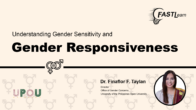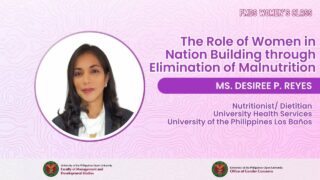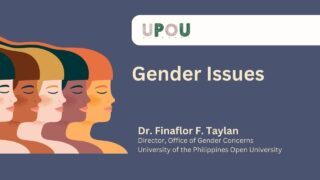What do you mean by gender sensitivity and gender responsiveness?
Okay, so let’s begin with gender sensitivity. It’s actually the ability of people or organizations or even policies or programs for them to be able to identify if there are gender issues embedded in those programs, policies or even activities. Kumbaga, siya yung kakayahan ng bawat isa sa atin na tao o ng mga organizations, para masabi at maprevent sana kung merong gender issues na nakalakip doon sa ating mga iniisip na mga programa, proposals, policies. Pag tungkol naman sa gender responsiveness, kumbaga requirement yung pagkakaroon ng gender sensitivity para matawag nating gender responsive yung isang programa, policy, or activity. But when we say gender responsiveness kasi, mas may action involved doon because we are hoping that there are preventive or rehabilitative or transformative policies or programs that will enable us to prevent or address gender issues from happening. So these two concepts are very much interrelated to each other, but usually in the policies of our government or even in the frameworks that we use in organizations, they work hand-in-hand or usually they are being used interchangeably.
What is the importance of these concepts in our daily lives?
These are all important, gender sensitivity, gender responsiveness, or even the general perspective or development perspective or development framework na gender and development.Una sa lahat, they are embedded in all our policies at the national level, even at the international level, because the Philippines is a signatory to the various United Nations conventions related to gender and development, even elimination of all forms of violence against women, which is actually very much aligned and one of the goals of the implementation or operationalization of gender sensitivity. So, yon ang una, syempre compliance, but of course we are always after beyond compliance. Bakit ba natin gusto na magkaroon ng gender sensitivity and gender responsiveness? Kasi una, syempre, gender rights are human rights. We don’t want to be living in a society where there is violence, violence against anyone. And for our case, we are talking about violence against women or violence against any person based on their gender, yung tinatawag nating gender-based violence. So for all people, ayaw nating mangyari ito na mayroong gender issues around that will hamper our growth, our potential, our development, and of course our contribution to the society’s growth or development. Sa bawat isa naman sa atin, based on our roles, syempre importante ito. Like for students, importante na ang mga kabataan, ang mga estudyante, ang mga mag-aaral, are very much free to express themselves at very much protected from all forms of gender-based violence even within their homes, even in their schools kasi lahat naman nang ito ay major institutions for socialization and for their development as human beings. Sa ating mga adults naman, syempre importante na tayo din ay nagagawa natin at nakakapagcontribute tayo sa kung ano yung gusto nating icontribute, at naeexpress din natin yung ating mga sarili base sa kung ano yung pagkatao, o kung papasukan natin ito ng gender is yung ating gender identity. Because we believe that all human beings, no matter what their gender identity is and gender expression, we all have our rights to our expression and to contribute to the development of ourselves and of course of the society that we are living. At importante kasi na nauunawaan talaga natin yung kahalagahan nitong, yung gender and development at kung paano rin ito nakakahamper sa ating pagkatao at sa ating human rights per se, because as I mentioned, gender rights are human rights. Because it’s for everyone, not just for women alone, not just for LGBTQIA+, but it’s for everyone because everyone has their human rights. So importante na nauunawaan natin yung pagkakaugnay-ugnay ng mga ito.

























